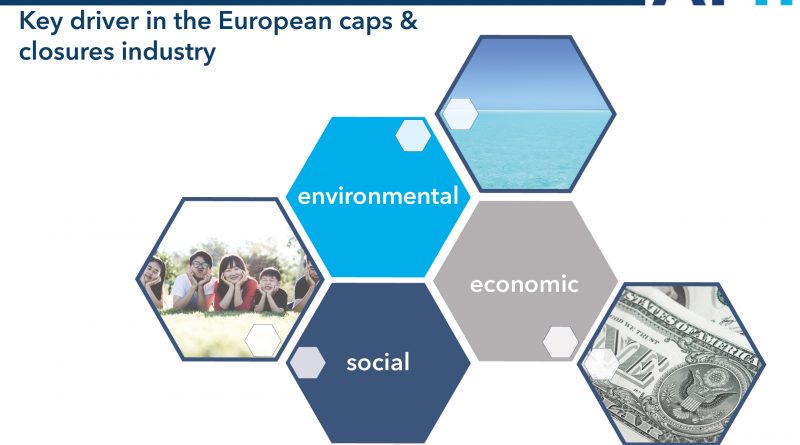The impact of tethered caps regulation on the European caps and closures industry
A new report from industry consultants, AMI Consulting published in June 2019 contextualises the new industry challenges and quantifies the impact of the changing regulations over demand: Sustainability is the key driver in the European plastic caps and closures industry; market development initiatives have so far been supported by the three pillars of sustainability, whereby environmental gains are commercially viable and socially accepted. The current regulatory context concerning the Single Use Plastics directive creates shifts the pillars out of balance, creating uncertainty in the value chain.
The European closures industry has been proactive for well over a decade to reduce the use of virgin material in both neck finish and closures. Lightweighting has been the most important driver of change. The last industry step-change within beverage closures was the shift towards 1-piece beverages caps and away from 2-piece caps, coinciding with the adoption of the PCO1881 bottle neck standard. Concomitant with raw material reduction are savings in energy, lower CO2 emissions in logistics and consequently – cost savings.
Now the focus of the European sustainability agenda is single use plastics (SUP), which includes the handling of caps in a circular economy and promoting anti-littering solutions. As a result of Single Use Plastics directive drafted in 2018 (2018/0172 COD), of which Article 6 dictates a new norm to enforce closures to be connected/tethered with the bottle has been voted in by the European Parliament in March 2019. The European plastic caps & closures industry is about the undergo another major step-change. The tethered cap regulation will impact plastic beverage bottles under 3 litres, including composite containers (i.e. carton). By 2024 all beverage closures will have to be tethered by law.
Ahead of the formal tethered cap standard, the industry is reviewing solutions to offer early compliance. There a number of technical variables to consider, including opening angle, torque, rotation of band, lock-in position, etc.), all of which may result in a different concept. Not to reduce consumer’s drinking experience, the tethered cap should allow for wide opening, locking-in position, no rotation and reclosibility.
The new regulation is intended to reduce littering; however, it will likely stir the demand for virgin polymers thus compromising industry’s committed efforts to lightweight. Short-term, the new closure designs are likely to be heavier than those on the market today. The industry will need to accommodate significant costs required for regulatory compliance. This creates a conceivable clash between environmental and economic pillars of sustainability and uncertainty over consumer acceptance of changes (social impact).
The report finds that the industry needs to work collectively to reduce the economic impact of the coming step-change and search for value creating opportunities to maximise the gains – environmental, commercial and consumer focussed.

